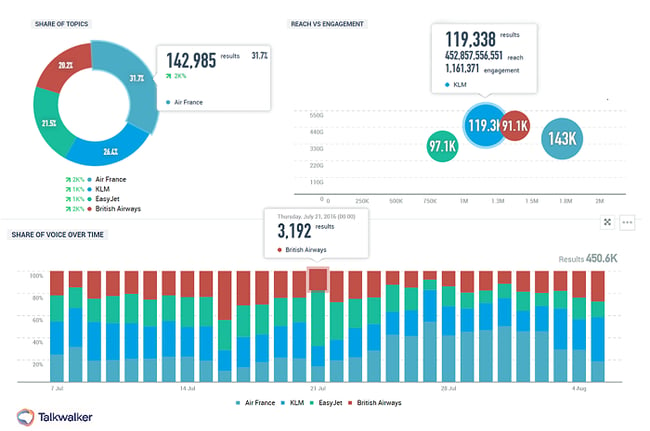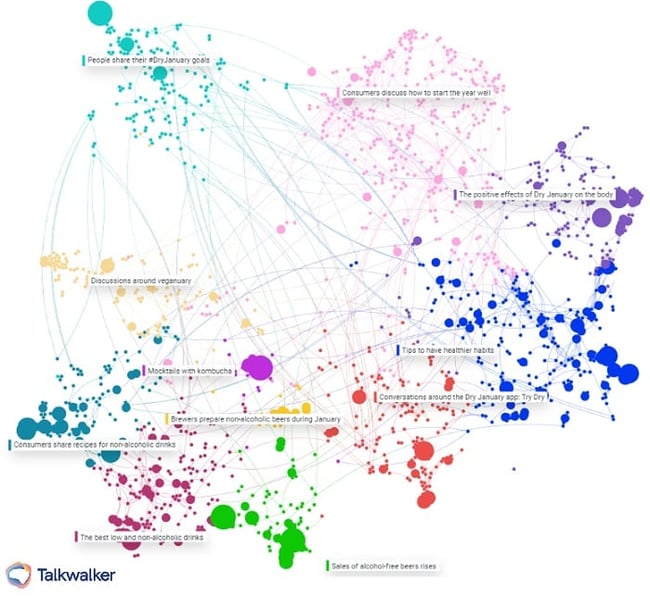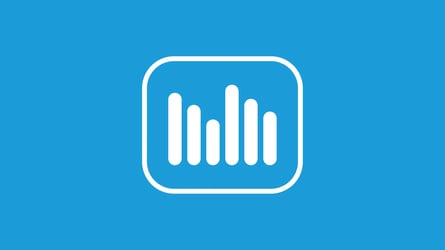What is B2B social listening?
Social listening is about monitoring and analyzing social conversations to gain insights into customer behavior, market trends, and industry sentiment. Although social listening is often associated with consumer-focused brands, it's equally relevant for B2B companies like yours.
By listening to your customers, competitors, and industry influencers, you can gain valuable insights. These can help you make informed business decisions, improve your marketing strategies, and enhance your overall brand reputation.
If you want to learn more, check out our social listening guide. Or keep reading to discover the top 5 benefits that B2B social listening can bring to your business.
1. Monitor consumer pain points
B2B solutions often revolve around addressing a specific pain point that your customers face in their daily work. But how can you keep track of these pain points? Social listening is the answer.
By listening to conversations about pain points, you can unlock two major benefits for your brand.
Find leads
Firstly, you can use social listening to identify potential leads by social selling. This means listening for people discussing problems that your solution can solve, and engaging with them. By joining in the conversation and providing helpful insights and content, you can build brand awareness and generate leads.
Use a content-driven approach to do this. Create valuable content that demonstrates how your solution addresses specific pain points, and drop this into relevant conversations. By offering help instead of a hard sell, you can establish your brand as a trusted resource in your industry.
Hi Colin! Diving into Semrush is a great idea—we have a ton of educational courses in our Semrush Academy to smooth your onboarding. Feel free to set up a free trial account to see how it works for you: https://t.co/6WliXhx7hj 🫰 - Sasha
— Semrush (@semrush) May 5, 2023
Semrush demonstrates social selling. Once they identify a potential buyer through social listening, they engage with educational content and a free trial.
Resolve issues
In the B2B world, it's common for customers to encounter issues in their day-to-day work life. Issues that they don’t report through official channels. Instead, they take to social media channels, blogs, and review platforms to voice their complaints.
Unfortunately, this can have negative consequences for your brand, from damaging your reputation to increasing churn and driving away potential customers.
With social listening, you can stay ahead of these problems by identifying issues as they happen and quickly resolving them. By responding to and fixing complaints, you can turn disgruntled customers into loyal ones. A powerful tactic in today's competitive market where 83% of customers feel more loyal to brands that address their concerns.
If you're looking to build lasting relationships with your customers, a social listening tool is an essential investment for B2B brands.
2. Monitor brand reputation
In the B2B world, reputation is paramount. Your brand's image can make or break your business, and it's essential to monitor what people say about you. That's where media monitoring comes in. It expands beyond monitoring social media platforms to include press, podcasts, reviews, and other media. This gives you a broader understanding of your customers.
This is valuable for measuring:
- Share of voice. This information is invaluable for measuring your share of voice, which is a key indicator of market share. By tracking all your brand mentions and those of your competitors, you can determine who is getting the most attention. If your share of voice is higher than your share of the market, you are likely to see an increase in market share.
A visualization showing how brands can compare their share of voice within the industry. Talkwalker Social Listening.
- Sentiment analysis. It's not just about the quantity of mentions. You also need to pay attention to the sentiment behind them. A net sentiment score measures whether people are saying positive or negative things about your brand. This score allows you to measure the impact of your B2B marketing efforts. And track whether your perception is improving over time.
3. Stay on top of your competitors
Conducting regular competitor analysis is important. By keeping tabs on your competitors, you can gain valuable insights and inspiration to inform your own business strategy.
Competitor analysis can involve a range of tactics, including:
- Monitoring their marketing campaigns. By analyzing their content and engagement rates, you can identify what works and what doesn't for your target audience.
- Analyzing conversations about their products or services. This can help you identify gaps in the market that you can fill with your offerings.
- Studying their target audiences. Understanding who your competitors are targeting and where they are located can help you refine your own audience and messaging.
- Examining their outreach efforts. By identifying the media and thought leaders your competitors are using, you can expand your own network and reach.
4. Identify industry trends for growth opportunities
It's important to understand the different types of trends and their implications for your brand.
- Micro trends are short-lived and can create a lot of hype but are usually fleeting. They can be valuable for engaging with customers now, but won’t have long-term implications for your business strategy. For example, a trending Twitter hashtag could drive conversations today but will be obsolete tomorrow.
- Macro trends are long-lasting and can have a significant impact on your industry. Understanding and adapting to these trends can drive brand growth and keep you ahead of the curve. Conversations around sugar, flavors, and diets are all macro trend examples in the food industry.
- Megatrends are global issues that have far-reaching consequences beyond your industry. Addressing these trends in your long-term strategy can help you stay relevant and competitive in the ever-evolving business landscape. The cost of living crisis and sustainability are examples of global megatrends.
Conversation Clusters help reveal the trends happening in your industry in real-time. In this example, it reveals the conversations happening around 'Dry January.' Talkwalker Social Listening.
Macro trends are a valuable source for identifying growth opportunities that lie in uncharted territory. To help you grow your business, it's important to analyze two types of trends:
-
Trends that reveal new personas with the same problem that you can solve. If your business can assist one department with a specific problem, expand your services to help other departments facing the same issue. For instance, Talkwalker initially focused on providing social listening solutions for social media marketing teams. We then identified that we could also help other departments, such as insights, PR, sales, and recruitment.
-
Trends that reveal new problems that you can solve for the same persona. If you're already providing a solution for a particular department problem, consider whether you look to help them with other issues that arise in their day-to-day operations. Talkwalker started by helping clients with social media strategy, but we now offer 16 different use cases that cater to different personas, all related social media listening.
5. Improve customer engagement
Engaging B2B audiences can seem like a daunting task, but it doesn't have to be. Engaging with your audience can lead to increased brand loyalty, positive word-of-mouth, and ultimately, increased revenue.
Stay on top of micro trends
To achieve this, relevancy is key. It's important to stay up-to-date with the latest buzz in your industry and engage in those conversations quickly. This is where B2B social listening comes in handy. It helps you identify and engage micro trends in real time.
Leverage brand influencers
Another effective way to connect with potential buyers is through influencer marketing. However, you don't necessarily need to partner with big-name influencers with millions of followers. Instead, focus on finding influencers who are discussing topics relevant to your brand and have an engaged community around those topics.
To learn more about how you can use influencer marketing effectively in your B2B marketing strategy, check out our comprehensive influencer marketing guide.
So much more to B2B social listening
B2B social listening offers a wide range of benefits that can help elevate your business. The aforementioned tactics are just a small sample of what you can achieve with a robust social listening tool. To take full advantage of these benefits, it's important to invest in a social listening tool that meets your business needs.
To learn more about Talkwalker's leading social listening solution, click below





